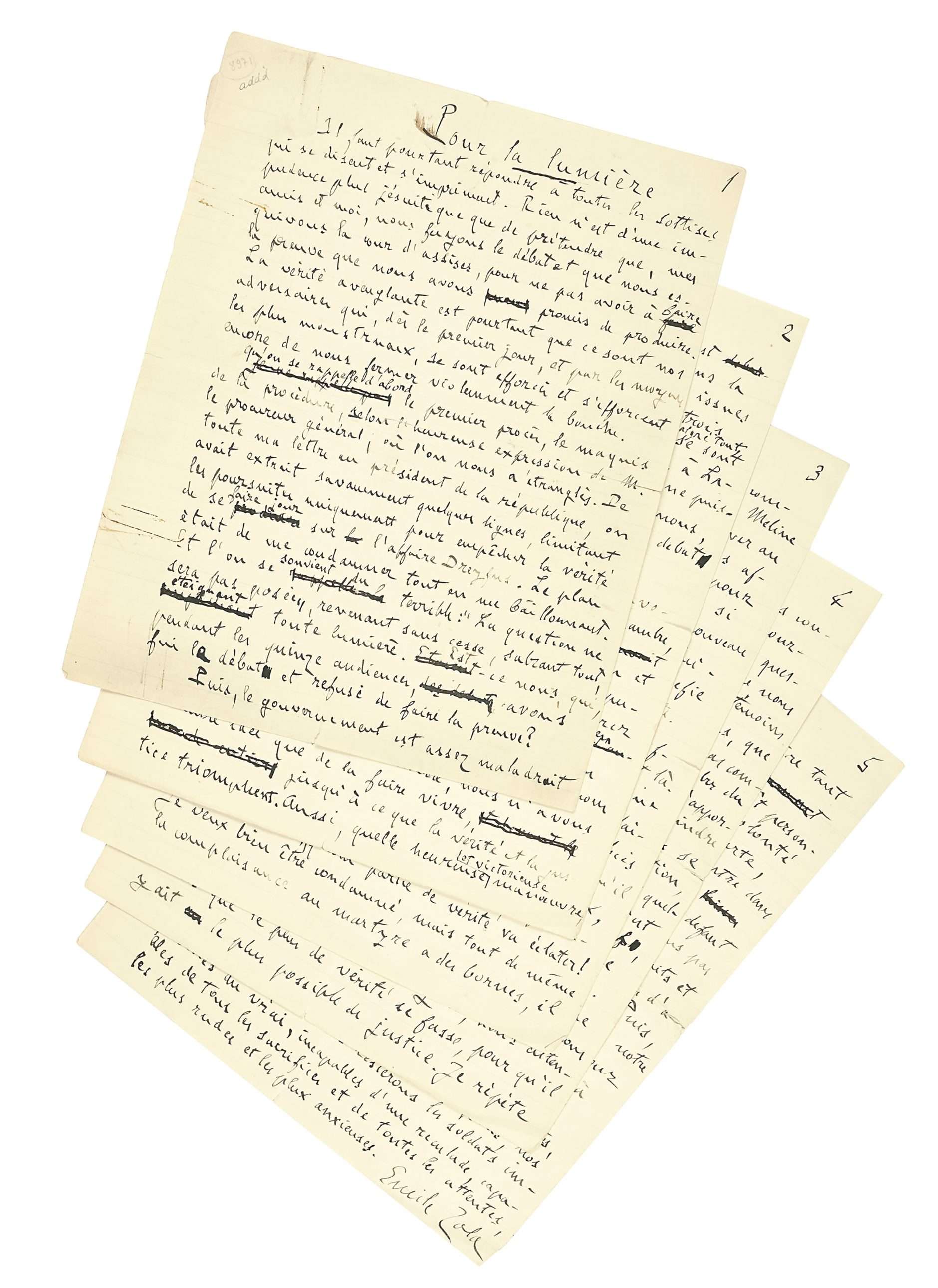[AFFAIRE DREYFUS] ZOLA, Émile (1840-1902)
Unpublished autograph manuscript, signed « Emile Zola »
[Grosvenor Hotel, London, 19 July 1898], 5 pages in-4 on ligned paper
« Of all my open letter to the president, a few lines had been skilfully extracted… to prevent the truth to shine on the Dreyfus affair »
Fact sheet
[AFFAIRE DREYFUS] ZOLA, Émile (1840-1902)
Unpublished autograph manuscript, signed « Emile Zola »
[Grosvenor Hotel, London, 19 July 1898], 5 pages in-4 on ligned paper
Fold marks, small hole at the folding junction on 5th folio, without affecting the text
Unpublished manuscript about the Dreyfus Affair
Six months after his open letter “J’accuse…!” to President Félix Faure, Zola looks back on his trial while testifying to his tireless commitment to the cause of Captain Alfred Dreyfus
« La vérité aveuglante est pourtant que ce sont nos adversaires qui, dès le premier jour, et par les moyens les plus monstrueux, se sont efforcés et s’efforcent encore de nous fermer violemment la bouche. […] De toute ma lettre au président de la République [« J’accuse…! »], on avait extrait savamment quelques lignes, limitant les poursuites uniquement pour empêcher la vérité de se faire jour sur l’affaire Dreyfus. Le plan était de me condamner tout en me bâillonnant. et l’on se souvient du terrible : ‘La question ne sera pas posée’, revenant sans cesse, sabrant tout, éteignant toute lumière. […] Enterrer l’affaire, tout l’ardent désir est là, il n’y a rien d’autre au fond de l’effroyable campagne qu’on mène contre nous […] nous n’avons d’autre idée que de la faire vivre jusqu’à ce que la vérité et la justice triomphent […] Les choses vont trop bien, l’abcès mûrit, nous avons tout intérêt à attendre qu’il crève. Comment ! Esterhazy est sous les verrous et l’on s’imagine que nous ne sommes pas curieux de savoir avant toute chose quelle partie de vérité va éclater! Je veux bien être condamné, mais tout de même la complaisance au martyre a des bornes […] On aura beau jusque-là travestir nos actes, prodiguer les mensonges et les ignobles injures, nos amis savent que nous resterons les soldats impassibles du vrai, incapables d’une reculade, capables de tous les sacrifices et de toutes les attentes, les plus rudes et les plus anxieuses. Emile Zola »
“Pour la Lumière” is an unpublished article by Émile Zola written in July 1898, six months after “J’accuse…!”, in the midst of the Dreyfus affair. This is the only article on the Affair that Zola wrote during his exile. Intended to appear on the front page of L’Aurore, it was never published, as it was most likely censored by Georges Clemenceau, who was editor of the newspaper. The latter used the present manuscript to publish “Pour la Preuve”, on the front page of L’Aurore of July 20, 1898. When reading both texts, “Pour la Preuve” appears much more watered down than “Pour la Lumière”, and largely expurgated in places. All the power of “Zolien” prose thus disappears in the guise of a bland and tasteless article.
The manuscript dates from the very beginning of the writer’s London exile. On July 18, 1898, Zola’s conviction, following the publication of “J’accuse…!” on January 13 of the same year, was confirmed by the court of Versailles. On the orders of Georges Clemenceau and his lawyer Fernand Labori, Zola left the France for London the same day, even before the end of the trial.
The circumstances surrounding the writing of “Pour la lumière” are fairly well known from various sources: Zola’s correspondence, the diary that the writer kept during his exile (published, later under the title of “Pages d’exil”), and a note that Bernard Lazare left on these events. The five pages of the article were written during the end of the day on July 19, 1898 in a small room on the top floor of the Grosvenor Hotel, in which the writer felt imprisoned: “the window was barred by the openwork frieze that crowns the whole immense building: a foretaste of the prison,” he reported in his “Pages d’exil”.
“Pour la Lumière” was to offer an answer to all those who accused the writer of fleeing justice while retrospective of his trial since his “coup d’éclat” of January 13, tipping point in the Dreyfus affair.
The manuscript, which has remained unpublished to this day, opens for Zola an exile that will last almost a year. No text of him concerning the Affair was published until June 1899, marking his return to his homeland.
Provenance:
Possibly Bernard Lazare
Then Alfred Cortot collection
Bibliographic references:
Alain Pagès, Émile Zola, un intellectuel dans l’affaire Dreyfus. Histoire de « J’accuse », Paris, Librairie Séguier, 1991, p. 271-272 ; Émile Zola. De « J’accuse » au Panthéon, Saint-Paul, Éditions Lucien Souny, 2008, p. 213-214 – Reinach Joseph, Histoire de l’affaire Dreyfus, Paris, Robert Laffont, « Bouquins », 2006 [1ère éd., 1901-1911], t. I, p. 1056-1057 (sur le procès de Versailles du 23 mai 1898) ; t. II, p. 32-35 (sur le procès de Versailles du 18 juillet 1898).
